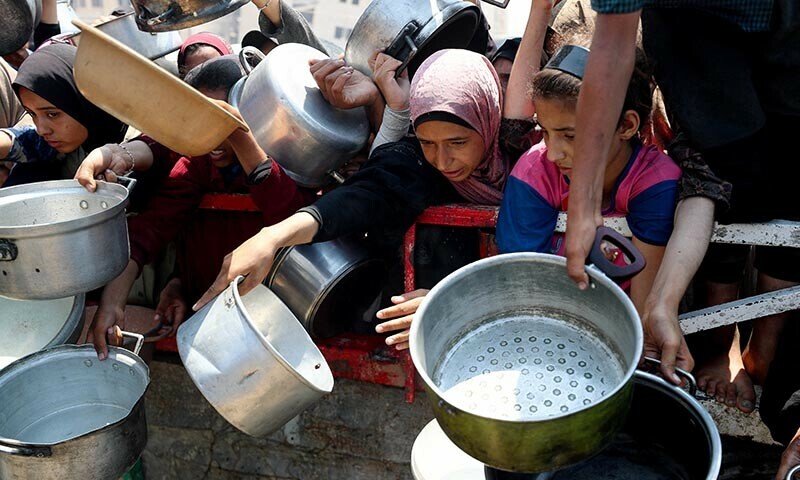Israel declared a “tactical pause” in fighting in parts of Gaza on Sunday and said it would allow the UN and aid agencies to open secure land routes to tackle a deepening hunger crisis.
Israel imposed a total blockade on Gaza on March 2 after ceasefire talks broke down. In late May, it began allowing a small trickle of aid to resume, amid warnings of a wave of starvation.
Yesterday alone, over 50 more Palestinians had been killed in Israeli strikes and shootings, some as they waited near aid distribution centres, the Palestinian civil defence agency said.
The pause in fighting would be limited to areas where the military says Israeli troops are not currently operating — Al-Mawasi, Deir el-Balah and Gaza City — and last from 10am (12pm PKT) until 8pm every day.
The military also claimed it had begun air-dropping food into the territory and rejected allegations it was using starvation as a weapon against Palestinian civilians.
In a statement, the army said it coordinated its decisions with the UN and international organisations to “increase the scale of humanitarian aid entering the Gaza Strip”.
There was no immediate official response from the UN or non-governmental aid agencies operating in Gaza, and privately sceptical humanitarian sources said they were waiting to see the results on the ground of the Israeli announcement.
The Israeli statement added that “designated secure routes” had been opened across all of Gaza to enable the safe passage of UN and humanitarian aid organisation convoys delivering and distributing food and medicine.
The Israeli military insisted these operations, alongside its ongoing campaign against Palestinian armed groups, should disprove “the false claim of deliberate starvation in the Gaza Strip”.
Before Israel announced the airborne delivery of seven pallets of food, the United Arab Emirates had said it would restart aid drops and Britain said it would work with partners, including Jordan, to assist them.
“We ask God and our Arab brothers to work harder to reach a ceasefire before we all die,” Gaza resident Hossam Sobh told AFP, adding that he had feared death as he recovered a bag of flour under the nose of an Israeli tank.
Activist boat seized by Israeli troops
Also on Saturday, Israeli troops boarded a boat carrying activists from the Freedom Flotilla Coalition as it attempted to approach Gaza from the sea to challenge a naval blockade.
“Israeli forces illegally boarded ‘Handala’ in international waters, abducting 21 unarmed civilians,” the FFC said on X, sharing a video that showed purported Israeli soldiers taking away the activists.
“Demand your government end its complicity in Israeli war crimes, ensure the unhindered delivery of humanitarian aid, and call for the immediate release of all crew members,” the coalition said.
The live feed on the Handala boat belonging to the FFC showed Israeli troops boarding the vessel.
The soldiers moved in as the boat approached Gaza and three live video feeds of the scene broadcasting online were cut minutes later.
The boat carries at least five citizens from the United States, three from France, two from Italy, Spain and Australia, and one each from the United Kingdom, Norway and Tunisia.
The humanitarian situation in the Palestinian territory has gravely deteriorated in recent days, with more than 100 NGOs warning this week that “mass starvation” was spreading in Gaza.
On Telegram, the Israeli military announced it “carried out an airdrop of humanitarian aid as part of the ongoing efforts to allow and facilitate the entry of aid into the Gaza Strip”.
Humanitarian chiefs are deeply sceptical that air drops can deliver enough food safely to tackle the deepening hunger crisis facing Gaza’s more than two million inhabitants.
But British Prime Minister Keir Starmer backed the idea, vowing to work with Jordan to restart air drops. The United Arab Emirates said it would resume air drops “immediately”.
‘Starving civilians’
A number of Western and Arab governments carried out air drops in Gaza in 2024, when aid deliveries by land also faced Israeli restrictions, but many in the humanitarian community consider them ineffective.
“Air drops will not reverse the deepening starvation,” said Philippe Lazzarini, head of the UN agency for Palestinian refugees, UNRWA.
“They are expensive, inefficient and can even kill starving civilians.”
Israel’s military insists it does not limit the number of trucks going into Gaza, and alleges that UN agencies and relief groups are not collecting aid once it is inside the territory.
But humanitarian organisations accuse the army of imposing excessive restrictions, while tightly controlling road access within Gaza.
A separate aid operation is under way through the controversial Israeli- and US-backed Gaza Humanitarian Foundation (GHF), which has faced fierce international criticism after Israeli fire killed nearly 800 aid seekers near distribution points since May 27.
A report by The Guardian revealed that food-deprived Palestinians in Gaza get as little as eight minutes to grab aid from GHF sites, which are located in evacuation zones, meaning that displaced Palestinians have to enter the areas they have previously been ordered to leave.
Much of Gaza now lies in ruins after 15 months of fighting, which erupted on October 7, 2023 when thousands of Hamas-led gunmen attacked Israeli communities around the Gaza Strip, resulting in the deaths of 1,219 people, according to Israeli tallies, and abducting 251 hostages into Gaza.
The Israeli campaign in response has killed at least 59,733 Palestinians and destroyed much of the housing and infrastructure in the enclave, including the hospital system. The death toll is feared to be much higher due to thousands still missing under the rubble.
